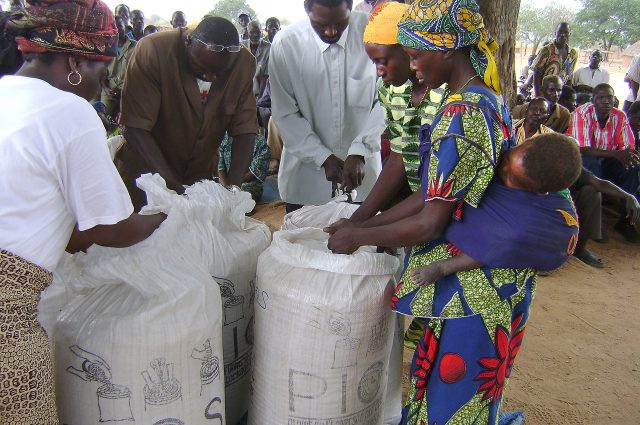The Purdue Improved Crop Storage (PICS) bag that is designed to prevent insect-caused post-harvest losses for farmers in developing countries, is now commercially available for farmers worldwide.
The PICS technology, which received funding from the Bill & Melinda Gates Foundation, is a triple layer sealed plastic bag that cuts off the oxygen supply to create hermetic conditions, thereby eliminating insect damage in storage of dry grain.
The use of PICS bags provides farmers the flexibility to sell their grains when they choose while supplying healthy, clean and insecticide-free food to their families throughout the year.
In addition to the physical bags, the PICS project also provides demonstration of the bags and training to farmers.
Larry Murdock, a distinguished professor in Purdue’s Department of Entomology in the College of Agriculture, invented the PICS technology.
Along with Murdock, Dieudonné Baributsa, an associate professor of entomology, and Laurie Kitch, a former Ph.D. student of Murdock’s, founded PICS Global Inc., a company with a goal of providing a chemical-free, low-cost method to improve food availability for millions of farmers around the world.
Murdock said the PICS journey started in the 1980s.
In 2007, Murdock and his Purdue-based associates received US$12 million from the Bill & Melinda Gates Foundation for the first phase of the PICS project, PICS1.
PICS was implemented in 10 countries in West and Central Africa, including Nigeria, Niger, Burkina Faso, Ghana, Mali, Senegal, Cameroon, Benin, Togo and Chad.
By the end of 2013, the project had reached 31,000 villages and 1.7 million farmers, and 2.5 million bags had been sold.
In 2011 PICS team received a second grant from the Gates Foundation to explore the usefulness and value of the bags for controlling storage insect pests of additional crops including maize, sorghum, wheat, rice, peanut, common bean, hibiscus seed, mung bean, pigeon pea and Bambara groundnut.
“Although initially the bags were specifically made for cowpea storage, it wasn’t long until farmers started asking about using the bags for other crops,” Baributsa said.
“We tested crops all around the world including Afghanistan, India and several countries in Sub-Saharan Africa.”
“We determined that the bags were good for storage of all these other crops without modification.”
In 2014, the PICS team received the third grant from the Gates Foundation for a five-year project to commercialize the bags in Sub-Saharan Africa to improve market access and food security among smallholder farmers.
The bags are being promoted in seven countries – three in West Africa, three in East Africa, and one in Southern Africa.
Ten years after the current version of the PICS bag started to be disseminated, PICS Global was established to leverage the success of the project by finding ways to reach larger markets outside of Africa and align the supply chain to provide the bags to farmers more efficiently.
“Right now our big question is, how do we get into larger markets like India, Nepal or Bangladesh where we don’t have a primary donor to fund the project?” asked Kitch, who also serves as CEO of the company.
“That’s why we started nurturing the idea of a private company, which will also help us better align the supply chain so we are able to produce enough bags, and get them to farmers at the right time and fast enough.”
By 2017 the project had reached more than 56,000 villages, five million farmers had been trained and more than 12.5 million bags had been sold.
Baributsa said the company is looking into consolidating manufacturing.
“The company could possibly develop manufacturing hubs in specific regions to be able to increase production and then inevitably reduce the cost of production,” he said.
“Farmers right now are paying about $2.20 to buy a bag that can store 220 lbs. of grain.”
“If we are able to make the manufacturing and supply chain process more efficient, we should be able to reduce the cost even further.”
Technology used by PICS Global Inc. has been licensed through the Purdue Research Foundation Office of Technology Commercialization.










